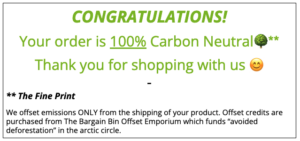
Greenwashing… often times you know it when you see it. Buzz word promises, unfeasible commitments, and at times mistruths. Greenwashing is the marketing of untrue, unsupported, or misleading information. This information provides false confidence to the eco-conscious consumers leaving them feeling confused, embarrassed or distrustful when the truth emerges.
Greenwashing threatens an organization’s reputation, and social license. A famous example you may be aware of was when Volkswagen cheated on vehicle emissions tests and falsely marketed their TDI diesel engine as low emissions and eco-friendly – that was greenwashing; in that case it was illegal and as a result it cost them billions.
–
Not all greenwashing is malicious. With the increase in demand for more sustainable products and services, organizations rightfully want to showcase their efforts and achievements. This drive to share sustainability efforts is good! However, with rapidly evolving consumer demand and shifting local, provincial, and federal regulations, it can be difficult to say the right thing. For some, taking the time to understand the history and language of sustainability can prevent greenwashing. For others, these added steps can lead to greenhushing.
Greenhushing is the counter phenomenon to greenwashing; it is the conscious act of underreporting sustainability practices to avoid scrutiny. Sustainability is a journey and organizations should not be afraid to share their story. While careful consideration should be taken to avoid greenwashing, failing to communicate sustainability and not telling your story can cost organizations in the form of lost revenue opportunities, and lost opportunities to improve customer and employee attraction, retention, and engagement.
–
If you are ever stuck and need guidance on finding the happy balance between how to avoid greenhushing or greenwashing, here are some helpful reminders.
The Green & Golden Rule:
Act First and Share Second
Aim for transparency in action and authenticity in communication
- Publish baseline metrics and current data to showcase clear and quantifiable improvements and to substantiate claims
- Acknowledge missed targets, negative impacts and opportunities for improvement
- Publish annual updates that showcase the goal of continuous improvement
- Engage in third-party verification, where possible
Create and leverage a sustainability action plan to tell a credible story
- Define your sustainability commitment
- Regularly measure and monitor your current performance – the baseline data shows changes over time and naturally tells a sustainability story
- Connect each sustainable action to a specific goal and target
- Celebrate achievements and challenges – summarize what you’ve accomplished to date and the bumps encountered along the way
- Leverage completed goals and targets to identify logical next steps and showcase commitment to a sustainable future
–
A great free, online resource that can help your organization generate ideas for sustainability stories, as well as combat greenwashing, is the GreenStep Sustainable Tourism Score assessment. The assessment takes 1-2 hours to complete and will walk you through assessing your organization or destination against globally recognized best practices. Upon completion, your organization will receive a score card indicating areas of strength and opportunities for improvement. For more information visit: https://www.greensteptourism.com/free-sustainable-tourism-score/
For organizations wanting to formalize their commitment to a sustainable future, the Sustainable Tourism 2030 Pledge is a fantastic opportunity to align with global best practices and join a community of like-minded sustainability leaders in Canada. The purpose of the pledge is to encourage tourism businesses and destinations measure and their sustainability performance, and to make a commitment to improving their results annually between now and 2030. By simplifying the steps and removing the cost barrier through free measurement tools, we can create a common framework and benchmark for the national and even global tourism industry. To learn more about taking the Sustainable Tourism 2030 Pledge visit: https://www.sustainabletourism2030.com/pledge/
Written by Adam Kunis

